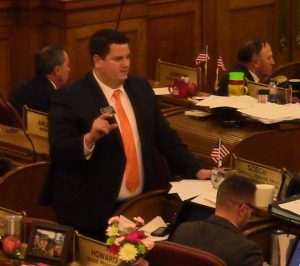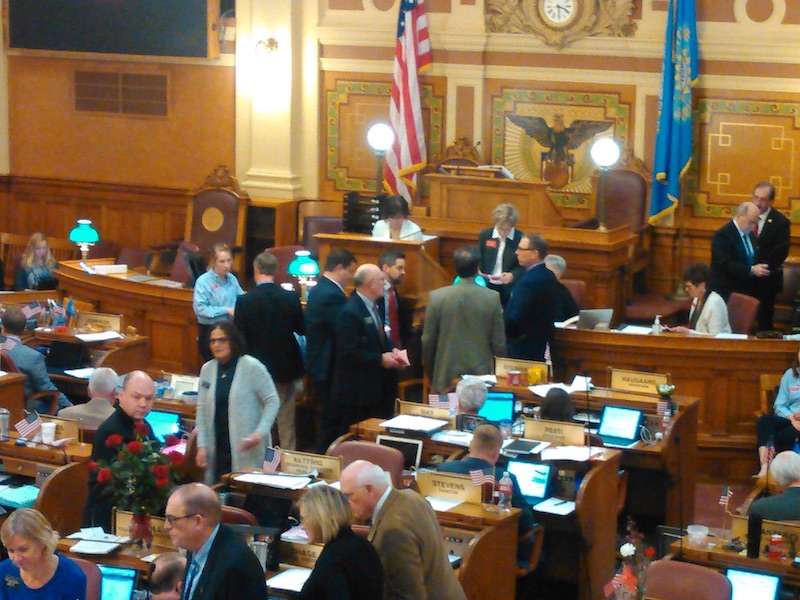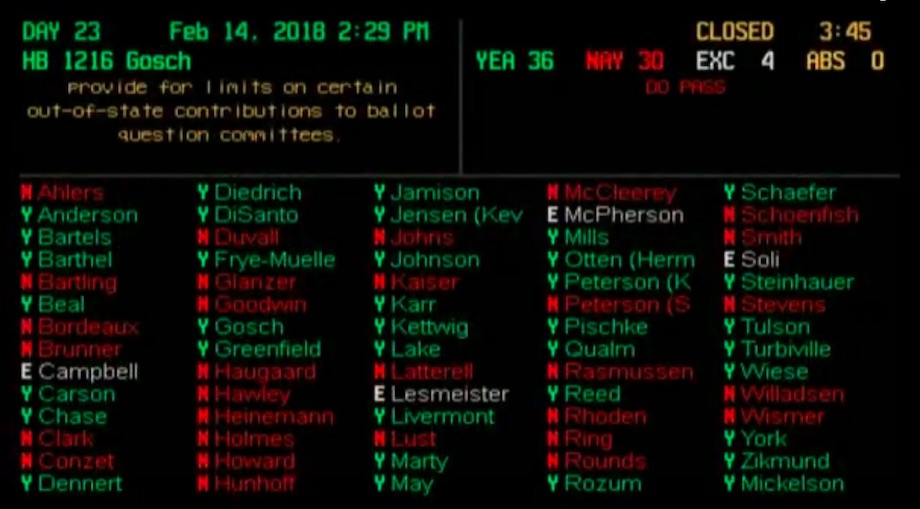Out-of-State Money Cap Narrowly Passes on Second Vote
A funny thing happened Tuesday to Rep. Spencer Gosch’s House Bill 1216, his recycled cap on out-of-state contributions to ballot question campaigns. Rep. Gosch bragged about the House’s passage of his similar bill last year 50–18 and exhorted them to do the same with HB 1216.
Now even I, a staunch opponent of HB 1216, will admit that Gosch wrote a more workable bill this year than last year. And with far more knives out this year to kill the ballot question process than in 2017, one would think HB 1216 would have more wind in its sails.
But no—no, said twelve more legislators than last year.

The vote on HB 1216 was 35–30. Five members were absent, but their absence doesn’t change the fact that bills pass our Legislative chambers only on a vote of a majority of the members elected, not the members present. No matter how many legislators are absent, a bill must receive 36 votes to pass the House. Gosch’s bill thus got more Yeas than Nays and still failed.

Gosch immediately called for the Speaker’s attention to signal his intent to reconsider. Speaker-Elect Steven Haugaard was manning the podium (allowing Speaker G. Mark Mickelson to be on the floor to speak for this very bill) and banged his gavel before recognizing Gosch. Rep. David Lust called point of order and noted that the gavel had fallen. Haugaard agreed and said the bill was lost.
Gosch protested: “I had clearly said ‘Mr. Speaker’ before the gavel had fallen.”
“You clearly had,” replied Haugaard, “but I had still struck the platform, I had not heard your request.”
After an awkward pause, the acting Speaker declared recess, and procedural manuals blossomed like carnations all around the chamber.


Three minutes later, Haugaard banged the gavel again and recited Joint Rule 5-11, which states, “Notice of intention to move for reconsideration shall be made before the body proceeds to the next item of business.” Haugaard incorrectly stated that, even after the gavel, the House is still engaged with the issue just gaveled. He correctly stated that, after the gavel, the House has not yet moved on to the next order of business. The proper interpretation is that, between the gavel and the next words sounded in the chamber, there is a blissful interregnum, a Zenlike moment of businesslessness when we have put down one piece of business but not yet taken up the other. Agendaed business is imminent but not present. Many other things could happen: a recess (as happened Tuesday!), a motion to suspend the rules, a point of personal privilege… and a member’s signal of intent to reconsider.
(Dang: I should run for House. I’d like being Speaker. To chair the Senate, I’d have to be Lieutenant Governor… hey! Billie!)
Anyway, Representative Gosch got his day to twist arms and his second vote this afternoon. He needed one vote. He netted one vote:

Rep. Gosch lost six Yeas: Reps. Glanzer, Heinemann, Holmes, Rhoden, Rounds, and Willadsen supported HB 1216 yesterday, then voted Nay today. Rep. Wismer came back from excused to add her Nay.
But Gosch persuaded seven Nays to come his way: Reps. Chase, Diedrich, Frye-Mueller, Qualm, Schaefer, Turbiville, and York. Lose six, gain seven—that puts Yeas up one and puts HB 1216 on Senate State Affairs’ agenda, maybe sometime after crossover next week.
Nonetheless, even in this second vote, Gosch’s effort to cut off funding sources to ballot question committees drew 14 fewer supporters in the House and 13 more opponents than his bill last year. If last year’s tendency holds, the Senate will torpedo HB 1216. But many minds can change over a year… or, as we saw today, over 24 hours.
Cory,
Does this bill restrict Soros money from SD?
Funny you should ask, Jason. Soros has had no involvement with any ballot question campaigns, and this bill deals strictly with ballot question committees, so it would seem this bill is irrelevant to whatever paranoid McCarthyite blatherings you imbibe on your fake-news Facebook pages. The out-of-state money invested in the 2016 campaign came in far larger proportion from the Koch Brothers and other free-market radicals.
But in floor debate, Rep. Gosch laid the groundwork for escaping the constitutional challenge to HB 1216 by saying his bill does not restrict free speech because it sets no limit on independent expenditures, it just caps contributions from certain individuals and entities (i.e., non-South Dakotans) directly to ballot question committees. So in practice, HB 1216 will actually do little if anything to stop out-of-state interests like the Koch Brothers from pouring huge sums of money into our campaigns to pervert our politics (as G. Mark Mickelson used to say before big money scared him off). Instead of giving money to an in-state ballot question committee, those plutocrats will just buy ads and hire canvassers themselves. The only substantive change involved there is that they’ll have to file independent communications paperwork, which for billionaires like the Kochs and Henry T. Nicholas is a trivial matter with no stopping power.
Cory,
Why didn’t you report this?
South Dakota Republican Party calls on Democrat Billie Sutton, other Democrats to provide full disclosure on campaign finance reporting
South Dakota Republican Party Chairman Dan Lederman today called on Democrat candidate for Governor Billie Sutton to provide full disclosure to South Dakota voters of who exactly is funding his campaign in light of a recent decision from the Secretary of State that campaign fund bundling organization ActBlue is not actually a Political Action Committee.
“The Secretary of State’s office notified the out of state campaign bundler ActBlue that they are not a Political Action Committee for reporting purposes,” Lederman said. “As a result, they are terminating the ActBlue PAC, and requiring that contributions be recorded correctly.”
Lederman continued, “In his most recent campaign finance report filed about two weeks ago, Democrat for Governor Billie Sutton reported that he collected over $184,000 in donations through ActBlue, without reporting the original source of the funds. According to the Secretary of State, they’re not a PAC, so Sutton should have reported each donation over $100 individually, instead of hiding it behind ActBlue as the single donor.”
“The South Dakota Republican Party is requesting that the Secretary of State enforce their decision on not just Democrat candidate for Governor Billie Sutton, but on all campaigns who made reports in the past few weeks where they did not provide the individual donor disclosure that law requires,” Lederman said.
http://southdakotagop.com/stay-informed/press-releases/sdgop-calls-on-democrat-billie-sutton-other-democrats-to-provide-full-campaign-finance-disclosure/
Again, Jason thinks I should spend my time responding to SDGOP press releases rather than working through bills in the Legislature.
Oh, but wait: I did report on the Secretary’s flip in her interpretation of campaign finance rules and ActBlue reporting.
Asked and answered…. and Spencer Gosch’s campaign finance bill is still unconstitutional, something Jason can’t admit and wants desperately to distract us from.
Cory
Your facts are bigger than Jason’s alternative facts.
Cory,
Just because “you” think it’s unconstitutional doesn’t make it unconstitutional.
Sorry, Jason: you don’t get to dismiss precedent and expert analysis provided in the links as “just Cory’s opinion.” At that point, we’re not having a discussion, because I can say the same thing about your words—just because you think it’s constitutional doesn’t make it constitutional—and we’re stuck in nihilist relativism.
I offer support for my position, as always. You offer personal-targeted sniping.
Cory.
Where in your article is a link to precedent and expert analysis saying the Gosch bill is unconstitutional?
Oops! Jason’s protests are so tedious and repetitive that I forgot which post he’s griping about. He’s actually right—I didn’t include the links on the unconstitutionality of Gosch’s proposal in the priginal post. My apologies, Jason.
The second link, on overlapping bills, does link to the main story on the unconstitutionality of Mickelson’s money ban. The same precedent and Constitutional analysis will sink Gosch’s HB 1216 for violating free speech and equal protection. Reps. Johns and Lust also did a good job of explaining case law, which has found limitations tolerable when serving the compelling state interest in checking corruption in candidate races but has found no concerns for corruption in ballot question campaigns.